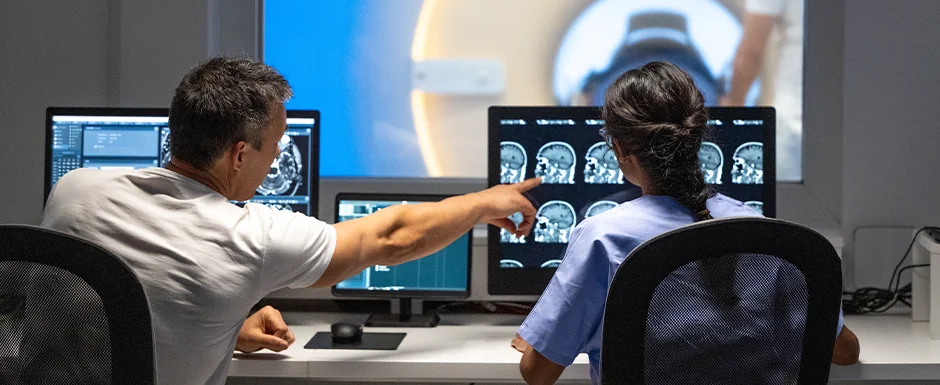Blogs
Looking for Radiology Tech Jobs? What You Need to Know

Table of Contents
Radiology tech jobs offer an exciting opportunity in the rapidly expanding field of allied health. As specialists in medical imaging, radiologic technologists play a crucial role in patient care and diagnosis. Let’s discuss what does a radiology tech do, why these positions are becoming increasingly popular, and why you should consider a radiology career path.
The Growing Need for Radiology Tech Jobs
The demand for radiology techs is on the rise, driven by several factors. With the aging of the baby boomer population, there has been an increased need for diagnostic imaging and early detection screenings as they help detect and monitor conditions related to aging. Technological improvements in medical imaging and the emergence of AI-assisted diagnostics are also increasing the demand for radiology tech jobs and making radiology techs vital to patient care, as these advancements necessitate professionals with specific training and skills. The expansion of healthcare facilities is further creating opportunities as qualified radiology techs are needed to help serve growing outpatient clinics, diagnostic centers, hospital radiology departments, and mobile imaging units, especially in rural areas.
Skills and Qualifications Required for Radiology Tech Jobs
To understand what does a radiology tech do and pursue this career path, certain skills and qualifications are necessary. They include:
- Education Requirements: Typically, radiology techs jobs require an associate’s degree in Radiologic Technology, which takes about two years to complete, or a bachelor’s degree in Radiologic Sciences for advanced positions, which takes four years. Coursework includes anatomy, patient care, radiation physics, and image evaluation.
- Certification and Licensing: Getting a radiology tech certification from the American Registry of Radiologic Technologists (ARRT) is crucial, along with state-specific licensing. You may also be required to pursue continuing education to maintain certification.
- Technical Skills: Technical skills and attention to detail are essential, including proficiency in operating complex imaging equipment, understanding radiation safety protocols, and the ability to produce high-quality images for accurate diagnosis.
- Patient Care Abilities: Patient care and strong communication abilities are also vital. Radiology techs must explain procedures to patients, address their concerns, position them correctly for optimal imaging, and collaborate effectively with other healthcare professionals to care for patients.
Radiology Tech Positions
Radiology techs can work in various healthcare settings, including hospitals, diagnostic imaging centers, outpatient clinics, and mobile imaging units. Some of the most common positions along the radiology career path include:
- X-ray Technologist: They use x-ray machines to take pictures of internal organs, bones, and tissues.
- MRI Technologist: They operate magnetic resonance imaging (MRI) machines that use strong magnetic fields and radio waves to produce detailed images of organs, soft tissues, bones, and other internal body structures.
- CT Technologist: They perform computed tomography (CT) scans, which use x-rays to create detailed cross-sectional images of the entire body.
- Nuclear Medicine Technologist: They administer radioactive materials to patients and use special cameras to image internal organs and functions.
- Radiation Therapist: They use radiation therapy machines to deliver precise radiation doses to patients to treat cancer and other diseases.
- Interventional Radiologic Tech: They operate specialized imaging equipment and assist radiologists in performing minimally invasive, image-guided procedures.
- Echo Tech (Echocardiography Technician): They use ultrasound technology to create images of the heart’s structure and function.
- Ultrasound Tech (Sonographer): They operate ultrasound equipment to produce images of internal body structures.
- Mammo Tech (Mammography Technologist): They perform mammograms using specialized equipment to screen for breast abnormalities.
- Cath Lab Tech (Cardiac Catheterization Laboratory Technologist): They assist cardiologists during invasive cardiovascular procedures.
Career Growth and Opportunities
Career growth and opportunities in this field are plentiful. The radiology career path offers many specialization options including advanced certifications in areas like cardiac-interventional radiography or radiation therapy, and the opportunity to focus on pediatric imaging or sports medicine. Management roles such as radiology department supervisor or director positions also become available with experience, as do opportunities in healthcare administration. Radiology techs can also transition to teaching and research positions, including instructing at radiologic technology programs or participating in clinical trials and equipment development.
Radiology tech jobs offer a promising career path for those interested in allied health professional jobs. With the growing demand for skilled technicians and the constant evolution of medical imaging technology, now is an excellent time to enter this field.
Looking for help searching for new Radiology Tech jobs?
Get the latest blogs, news and company updates
Want to get the latest staffing related news and updates? Subscribe to our resources to get insights sent straight to your inbox.